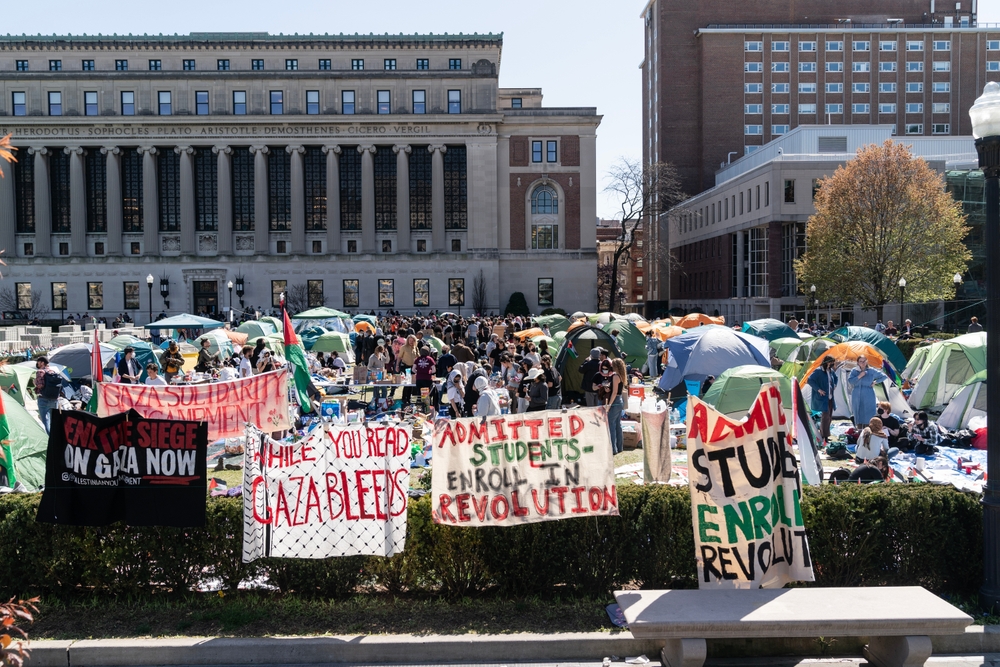The vast majority of Americans support a ceasefire in Israel’s war on Gaza, where the International Court of Justice has ruled there’s a real risk of genocide. That sentiment is especially strongly held by young people, who favored a ceasefire by a stunning 5 to 1 ratio in a recent poll.
Even many traditionally pro-Israel politicians have come to embrace that view. Yet the Biden administration has remained steadfastly supportive of Israel’s government — and Congress just passed a massive new military aid package for the country, in likely violation of both U.S. and international law.
The result? Protests against the war have exploded on college campuses across the country. And peaceful demonstrations have often been met with heavy-handed responses from college administrators, politicians, and police. They’ve faced suspensions, expulsions, arrests, and even violence, with some politicians calling for worse.
IPS was founded over 60 years ago in opposition to the Vietnam War. Our Vietnam Reader quickly became a textbook for anti-war sit-ins, which earned us a spot on Richard Nixon’s infamous “enemies list.” Our co-founder Marc Raskin was even arrested and tried as one of the “Boston Five” for encouraging nonviolent resistance to the draft.
Our experts are honoring that legacy today in their support of this remarkable student movement against genocide in Gaza.
Middle East expert Khury Petersen-Smith, for example, has been advising and organizing groups across the country — most recently in Boston, where he bolstered Emerson College demonstrators amid a brutal crackdown by Boston police. “There is a power in your hands,” he told them, according to the student newspaper. “I urge you to hold onto that feeling.”
Our Newman Fellow Sarah Gertler, meanwhile, has joined a series of demonstrations against the war by Jewish-led groups — and rejects the claim that it’s antisemitic to oppose Israel’s conduct of the war.
“Since the start of Israel’s war on Gaza (and long before that), there have been Jewish communities advocating for Palestinian rights,” she writes in a syndicated op-ed for The Progressive. “Being Jewish myself, I recently joined a Passover Seder at the UPenn encampment. The sunny, vibrant service — led by multiple generations of Jewish faith leaders — deepened the meaning of the liberation-themed holiday by connecting it to the struggle for Palestinian liberation.”
Many demonstrators have taken a page from earlier movements IPS experts helped popularize — including the anti-apartheid divestment movement of the 1980s and early ‘90s and the fossil fuel divestment campaign of the 2010s.
Like students before them, these young people are now calling on their universities to divest from companies that profit from Israel’s war on Gaza and its illegal occupation of Palestinian territories. Speaking to The Guardian, Phyllis Bennis urged demonstrators to pick politically strategic targets. “Try to answer to the question: if it succeeds, what is this action going to do to build the movement to stop the genocide?” she asked. “What’s it going to do to change Biden’s policy? That’s urgent.”
Our experts are also vigorously defending the right to protest itself.
In a must-read piece at In These Times, Basav Sen lays out the threats to democracy that go beyond our elections and courts — including new laws targeting protests.
“If we want to save our democracy, there is no substitute for an organized mass movement of people in the streets,” Basav writes. “Throughout history, in this country and elsewhere, social movements have challenged elite power — sometimes facing violence and repression — and won. If they hadn’t, Jim Crow segregation would still exist in the United States, the British Empire would still control South Asia, and South Africa would still be subject to apartheid.”
In a dangerous moment for our world and our democracy, we couldn’t be prouder to stand with the movements who are fighting for what’s right. Thanks for being in it with us.
